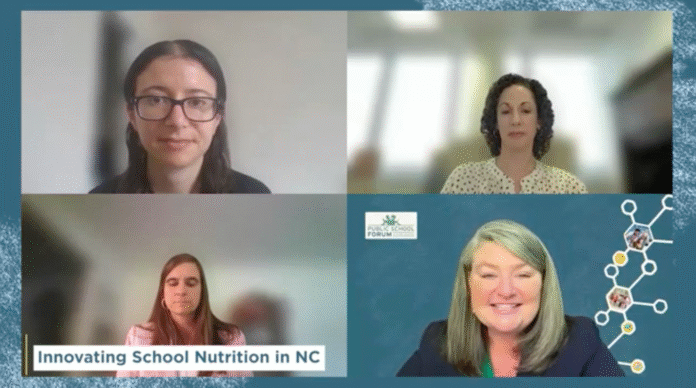The following is Mary Ann Wolf’s “Final Word” from the May 17, 2025 episode of Education Matters, featuring Dr. Jessica Soldavini, Rachel Findley, and Heather Lifsey.
In local public schools across North Carolina, something quietly transformative happens every day: Millions of students receive breakfast and lunch at no cost to their families. These meals can be the most consistent and nutritious food some children receive all day. And yet, school nutrition remains one of the most overlooked parts of our education system.
School meals are not just about feeding kids. They’re about creating the conditions for learning, development, and long-term well-being. A child who is hungry cannot focus, retain information, or regulate their emotions. Hunger can manifest as distraction, fatigue, or even behavior challenges, but when students have access to healthy, reliable meals they’re better prepared to succeed both inside and outside the classroom.
Nutritious school meals improve academic performance, attendance, behavior, and long-term health. And for low-income students, they also serve as a powerful equalizer. However, access remains uneven. That’s why many advocates across the state and initiatives like School Meals for All are pushing for universal publicly funded school meals. Universal meals eliminate paperwork, reduce administrative costs, and most importantly, ensure that no child is singled out for needing support.
North Carolina is uniquely positioned to lead this movement, not just because the need is urgent, but because the opportunity is vast. As one of the most agriculturally diverse states in the country, we grow an abundance of fruits, vegetables, dairy, and proteins. Programs like Farm to School are already connecting local farmers with school cafeterias, boosting both student nutrition and the state’s agricultural economy. With intentional investment, we can expand these partnerships and make sure that what’s grown here also nourishes our children.
Innovation is happening across the state. Some districts are redesigning school menus to reflect cultural diversity. Others are piloting mobile meal units, serving breakfast in the classroom, or sourcing ingredients directly from regional food hubs. In Western North Carolina, coalitions are working to build stronger local food systems, recognizing that rural schools face unique barriers as well as unique opportunities for collaboration and growth.
However, in order for these innovations to continue and expand, they require policy support, funding, and a public commitment to treating school nutrition as essential infrastructure. That includes fair wages for school nutrition staff, investment in kitchen equipment and local sourcing logistics, and long-term funding mechanisms that don’t rely on temporary federal waivers or fluctuating grant cycles.
The return on this investment is profound. Feeding students well can improve educational outcomes while also stimulating rural economies. Investing in school nutrition also sends a powerful message to students that their well-being matters — and that their school is a place where their full humanity is recognized and supported.
This is about more than food, it’s about giving our kids what they need in order to be successful. It’s about the kind of state we want to be. When we ensure that every child is nourished, regardless of their background or ZIP code, we build a stronger and smarter North Carolina.





